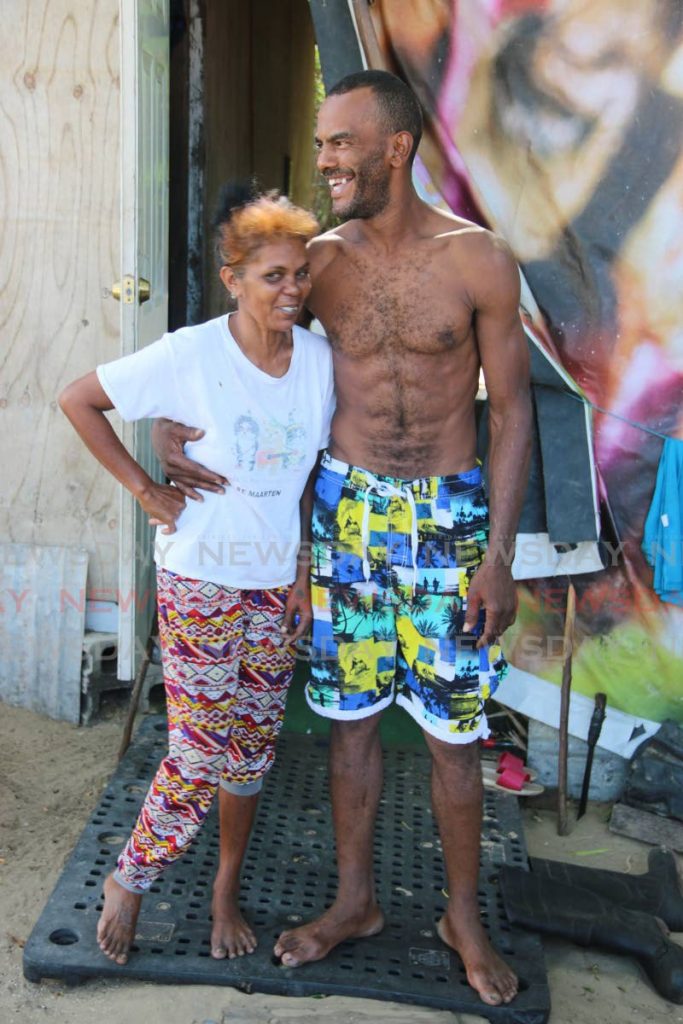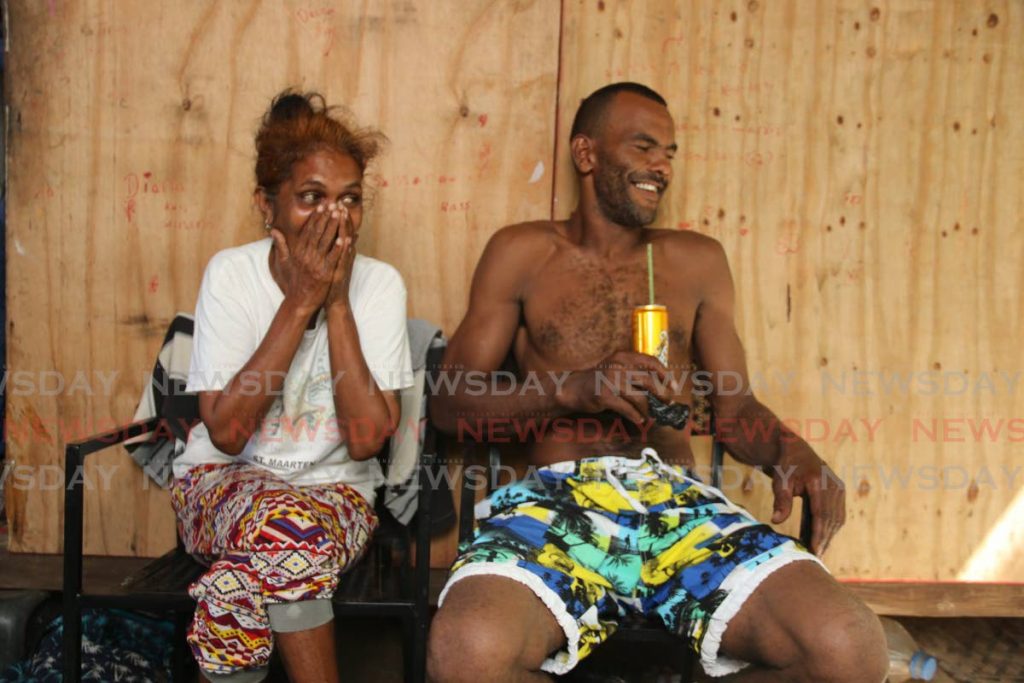Finding life, love behind bars

EDITOR'S NOTE: Last week we published this story of Emmanuel Clarke: how he was the victim of a miscarriage of justice, but later found happiness with Lalitha Tambie.
Clarke was eager to recount what had happened to him.
But on May 20 we took down this heartwarming, popular story from our website until we could take a closer look. A reader had alerted us that there was more to it than met the eye.
Crime reporter JENSEN LAVENDE obtained police records that showed a much darker picture.
Reporter NARISSA FRASER talked to Clarke again and confronted him with what Newsday had found out: that over the years he had been charged with numerous offences.
Today we are reposting this story so that readers can read both sides and make up their own minds.
Then read Part 2: Icacos beach-dweller has 23-year police record
HOW often does a man find the love of his life by accidentally texting the wrong number? Well, 42-year-old Emmanuel Clarke not only did this but did it while behind bars.
Sunday Newsday visited the southern village of Icacos and met Clarke and his common-law wife Lalitha Tambie, 54, who told us the story of how they met and what life is like in the remote area.
Clarke grew up in Petit Valley and was involved in fishing. But in 2014, his life changed drastically.
He was arrested and charged with larceny of a motor vehicle, kidnapping and sexual assault – crimes he was accused of committing on November 24, 2014, at approximately 3.30 pm, in Matura.
But Clarke was not even in Trinidad at that time. He was comfortably seated on an inter-island ferry en route to Port of Spain.
“I have documents to show where I boarded the TT Spirit at 1.49 pm in Scarborough and it arrived in Trinidad 4.39 pm. I’d like to think it’s impossible for one person to be in two different places at the same time.”
He said he was approached by police sometime after 5 pm and was detained. When he continually asked why he was there, he was told he had been “brought in for inquiries.”
After six days in police custody, he was shown a video of a man police claimed fitted his description, wearing a hat and with a bag on his back. But because the video was blurry, he was told it would take six months for it to be “cleaned up.” He was then asked if he was willing to volunteer to go on an identification parade – a process where several suspects who fit the victim’s description are lined up for one person to be chosen.
“I agreed to volunteer so fast because I knew I was innocent, so I couldn’t wait.
“What I could remember, it was me with about 14 other people. I was number three. She (the victim) came there in the presence of my mom.
“I expecting her to come forward and speak the truth. I wasn’t even in the country (sic) – and this woman came, looked at everyone, looked up to me and said, ‘Number three, it looking like he, inno. I think it might be he,’ and they slapped me with those charges.”
After that, he said he paid attorneys to write to the Port Authority for the documents to prove he had been travelling on the ferry from Tobago at the time. Four months later, the letter he had asked for arrived. Clarke finally began to see some light at the end of the tunnel and awaited his day in court, not knowing it wouldn’t be until 2017, more than two years later.
Accidentally finding Lalitha
Clarke told Newsday during his two years and nine months behind bars, he was transferred from the Port of Spain Prison to Golden Grove and the Maximum Security Prison. He said he got the “full experience” of how the prison system operates. And despite applying several times, he was never granted bail.
“When you’re in custody, everybody have a phone. The officers will take a small money and they will bring a phone for you.”
He said if someone did not have their own phone, they could rent one from a fellow inmate or prison officer.
“And when you in prison, everything does go by phone cards. Someone will call a person and they will send money on their (the prisoner’s) phone. If somebody send a $100 phone card for me, I could use that $100 phone card to buy marijuana, cigarettes, alcohol, even foodstuff.
“It have shops in the prison. It have people who do business like that. Their family will come and spend $2,000 in the canteen, buy big cases of water, soft drink, milk, and they sell it for phone cards.”
He said a box of cornflakes and a pack of powdered milk could cost a $150 phone card, though it would only come up to $60 or $70 had it been bought at the canteen. And cigarettes can cost as much as a $300 phone card.
Asked if he meant a pack, Clarke said, “No. One loose cigarette. Yuh family will Western-Union $1,000 for you to buy a pack of Du Maurier. You might get a lighter with it. Then that person might sell those at $100 (phone card) for one, so they will make $2,000.”
But one day Clarke sent $20 to the wrong person’s phone. Instead of a fellow inmate, this money reached Tambie. He didn’t expect it to be sent back, as he had sent money in the past to the wrong people, who kept it.
But Tambie told Newsday she would never do something like that.

“We started talking, and I would send money for him, and then one day I visited him. After that, I would visit once in a while and carry food for him and thing.”
She said initially, they were just friends as she told him, "I not looking for no man." But after speaking to each other for some months, she began to appreciate his genuine personality even more and the romance began.
She said when he was at Maximum Security Prison – where inmates are assigned (wall) phones that can be "topped up" by friends and family – she would travel to San Fernando "every now and then" to do so since it was the closest place to do so.
If she was lucky enough, she would get a taxi that could take her from Icacos to Point Fortin. But typically, someone from Icacos may have to get a taxi to get to Cedros, then Point Fortin. After this, she'd take another to get to San Fernando. And whenever she visited him in prison, she'd have to take yet another taxi to get to Port of Spain.
"I remember telling him, 'When you come out, you go dump me,' and he always used to say no. And the more we talk, the more I realised what he was saying was true.
"We would talk (on the phone) for up to 20 minutes sometimes. And he go still call back the next day."
Asked if they ever had a disagreement during his time in prison which caused them to stop speaking to each other, she said no. She recalled her first visit to the prison.
"I stopped in Point (Fortin) and I buy some foodstuff, towels, jerseys...I went in (the prison) and I didn’t know who it was cause we was just talking on the phone. I didn't know how he looked. And then they bring him so we could talk on the phone with the piece of plexiglass separating we."
She said she knew he would eventually be released after hearing his full story and believed he was innocent.
Around the time Clarke had been arrested, his mother had surgery for kidney cancer. While he was in prison, she died. He was not allowed to see her before she died, or attend her funeral.
“My mom passed away on October 25, 2015. She was grieving on her deathbed, and her last wish was to see her son, who she knew was in police custody as an innocent man.”
Becoming a free man
When Clarke's much-anticipated court date finally arrived in 2017, he said he was ready to prove his accusers wrong. He had used his time in prison to educate himself.
“I didn’t have the privilege of being able to read properly before prison. I kept practising.
“That was how I was able to read my disclosure when they gave it to me and see the big mistake the officers made, so I could have highlighted it in court.”
He said at his trial he asked Chief Magistrate Magistrate Maria Busby Earle-Caddle if one person could be in two places at the same time, to which she replied, “No, Mr Clarke.”
“I took out the document and said, ‘This is my evidence, ma’am.’ And she took the letter and when she read that and watch it, she watch the charging officer, she say, ‘Mr PC Ryan, please stand.
“‘This is the kind of matter you bringing here for me? Mr Clarke, you are dismissed and I am advising you to take legal action (against the State).’”
Clarke was free at last. But asked how he felt then, he told Sunday Newsday, "It was not really a nice feeling. Honestly, after spending so much time knowing I was innocent, it was just..."
He did not have a lawyer as he believed it was unnecessary and would have been a waste of money. "These documents were basically like my lawyer," he said.
He added that because of the hatred a prisoner experiences daily, it makes it very difficult to be a kind and loving person after being released. But he pushed through.
The beach is now home
Tambie grew up in Cedros and was married at 16. She and her husband had five children together, but he died in 2012 after a stroke. After this, since she had no job, one of her sons began taking care of her. But he was murdered near the family's home in 2017 for alleged involvement with a gang. And then the rest of her family turned against her.
“When I get (together) with Emmanuel, they run me out the house…
“And that’s how I end up in this situation here with he,” Tambie explains.
The family also refused to let her take the car her late husband had left to her. She said it is "parked up by them and rotting." All she was able to take was her clothes. She had lived there for 30 years.
“They kick me out, so I have nothing.”
Clarke then told her, "If they don't want you, come live with me." Since she had "no idea" how to get to Diego Martin, Clarke went to Point Fortin to meet her.
The two lived at Clarke's home for some time. But they said finding jobs in the area, in addition to regular crime, made them begin to consider looking for jobs in Tambie's hometown instead.
Clarke eventually got a job at the St Andrew's Estate in Icacos and left Diego Martin. He was given a room on the estate where he could stay with his wife. He said he always wanted to see what life was like in that part of the country.
But he lost this job after some coconuts from the estate went missing during the day, although he only worked nights.
Someone Tambie knew in the village of Fullarton told them, “That’s the beachfront, you could go ahead and build up a little thing.”
“We asked them for a few pieces of galvanize. Then we went in the hardware and we take some pieces of wood and thing with the remaining we had from his last salary. We still owing the hardware $600 since last year,” Tambie said.

The couple now lives on the shore at the Coral Point beach, along with other TT nationals and Venezuelans.
The one-room building on the beachfront has a bed, buckets to fill water, and a TV, despite not having electricity. Their neighbours, who are a footstep away, have electricity, which is where they get to charge their phones, among other things. Tambie said when they connected their building to the electricity supply, TTEC police visited and cut the lines.
Clarke makes money from fishing and selling coconuts. He is also a welder.
Tambie comments, though, “In Icacos, if yuh is not a fisherman or a farmer, it have no work for you.”
But Clarke said his wife gives him the inspiration to get through each day. And Tambie told Sunday Newsday he provides for her as best as he can and she is grateful.
“It have some times he will say, ‘You cook all week, I will cook today.’
“For Mother’s Day, nobody from my family call me. Emmanuel cooked macaroni pie, baked chicken and chow mein noodles.
“We don’t drink or anything like that. We might sit and relax and listen to a little music or something.
Clarke is now suing the State for wrongful arrest. He is being represented by attorney Anand Ramlogan’s law firm.
Ramlogan told Newsday he’s certain there are “many more Emmanuels” in prison who are innocent but are “languishing in horrible, oppressive, subhuman conditions.
“It is heartbreaking to know that he was not allowed to fulfil his mother’s dying wish to see him before she departed. Indeed, he was not even allowed to attend her funeral.
“True love was the silver lining in this dark cloud, but Emmanuel should never have been charged, far less incarcerated for so long…it is sad that it took so long for him to have his day in court to prove such a simple point and regain his freedom.
“We are suing the State for the breach of his constitutional rights and hope that justice will finally be served.”
Anyone who wishes to contact the couple can do so by calling 303-4995 or 366-7007.


Comments
"Finding life, love behind bars"